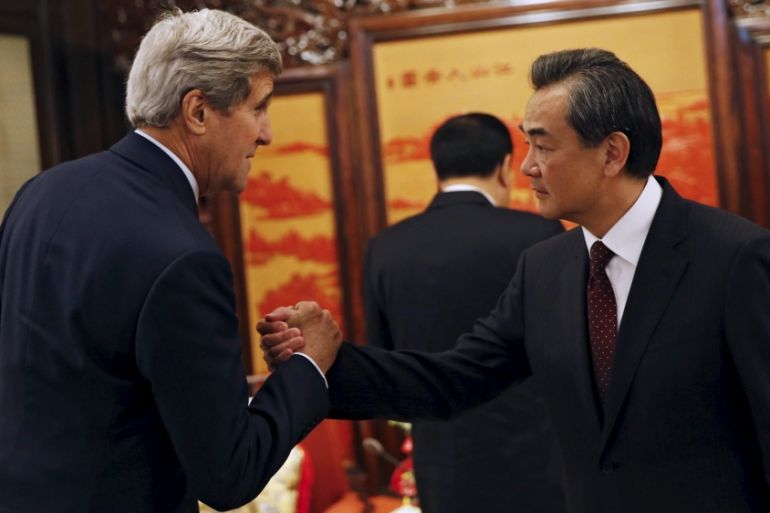China and US at odds over disputed waters
FM Wang says Beijing “unshakable” in its defence of sovereignty as US mulls sending warships to South China Sea region.

China’s foreign minister has told US Secretary of State John Kerry that Beijing is “unshakable” in its defence of sovereignty, as tensions between the two nations mount over disputed waters in the South China Sea.
The US is weighing sending warships and surveillance aircraft within 12 nautical miles – the normal territorial zone around natural land – of artificial islands that Beijing is building waters in question.
Keep reading
list of 4 itemsPhilippines summons China envoy over water cannon attack in South China Sea
China coastguard blasts water cannon at Philippine coastguard ship
Philippines and China in new confrontation at Scarborough Shoal
Such a move could lead to a standoff on the high seas in an area home to vital global shipping lanes and believed to be rich in oil and gas deposits.
After talks in the Chinese capital, Foreign Minister Wang said: “The determination of the Chinese side to safeguard our own sovereignty and territorial integrity is as firm as a rock and it is unshakeable.”
“It is the request of our people on our government as well as a legitimate right of ours,” he added sternly at their joint press conference.
Kerry was less assertive in public, saying that Washington was “concerned about the pace and scope of China’s land reclamation” and urged it “to take actions that will join with everyone to reduce tensions”.
The region needed “smart diplomacy”, he said, rather than “outposts and military strips”.
China claims
China claims about 90 percent of the 3.5 million-square kilometre South China Sea. The Philippines, Taiwan, Malaysia, Brunei and Vietnam also claim large parts of the sea.
China’s rapid reclamation effort around seven reefs in the Spratly archipelago of the South China Sea has alarmed other claimants such as the Philippines and Vietnam.
At the same time, China has expressed its concern about a possible US plan to send military aircraft and ships to assert freedom of navigation in the South China Sea.
The world’s top two economies have significant commercial ties and Chinese President Xi Jinping is due to pay a state visit to the US in September.
The US is China’s second-biggest trading partner after the European Union, with two-way commerce worth $555bn last year, according to Chinese figures.
Beijing is the heavily indebted US government’s biggest foreign creditor, figures from Washington showed Friday, reclaiming top spot from Japan with more than $1.26 trillion in Treasury bonds.